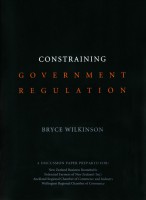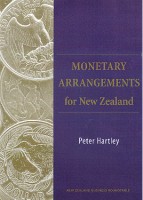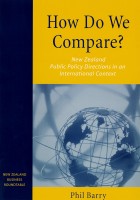
America and its Allies: Growing Together or Growing Apart? The 2002 Sir Ronald Trotter Lecture
There is no summary available. Read more


There is no summary available. Read more

One of the challenges faced by Australasia – that is, Australia and New Zealand – is the additional costs of doing business with the rest of the developed world, and vice versa. These costs go beyond the obvious – for transport and communications – to the costs of the infrastructure required to service customers and business partners, as well as of tapping global capital markets. Read more

I have come half-way around the world but I feel very much at home, with people who share not only a common language, but so much of my inherited experience. We are the descendents of the common law, of Magna Carta, of David Hume and John Locke. Read more

This collection of speeches, submissions and articles is the seventeenth in a series produced by the New Zealand Business Roundtable. The material in this volume is organised in six sections: economic directions; fiscal policy and the public sector; industry policy and regulation; education and the labour market; social policy and miscellaneous. Read more

Bryce Wilkinson examines the effects of poor quality laws and regulations on New Zealand society and outlines the case for regulatory reform. His proposals include a governmental review of major regulations and better regulatory analysis and, in the future, a Regulatory Responsibility Act to achieve principled scrutiny of new regulations. Read more

By comparison with some other countries, New Zealand relies heavily on education and health services and retirement income support provided by governments and financed through taxation. Much government education and health expenditure benefits families with moderate to high current incomes. Read more

Why should we care about the size of government? There are many reasons to be concerned, but the most obvious answer is that high levels of government spending and taxation suppress economic performance, which is the basis of material living standards. Read more

David Green explains why poverty studies based on expenditure or consumption are superior to those based on income. He argues that a more fundamental objection to many studies of poverty is that they divert attention from the more serious problems of welfare dependency and diminished personal responsibility. Read more

Corporate Social Responsibility (CSR) is a radical doctrine. It embodies a new and wider conception of the role of private business and the way in which it should be conducted. Read more

The issue of the best monetary arrangement for New Zealand was debated extensively at the end of the 1980s. The resulting Reserve Bank of New Zealand Act 1989 and the relatively light-handed regulation of the commercial banking sector were regarded by many economists as among the major achievements of the New Zealand institutional reform process of the 1980s and early 1990s. Read more
Statistics produced by Stern Stewart and the ANZ Bank on the destruction of shareholder value by New Zealand companies have attracted widespread publicity. They reinforce widespread anti-business sentiments.[1] One business magazine has interpreted them as a condemnation of "our scandalous management". Read more

Describing the shift in the New Zealand public sector from administrative controls to a performance-driven system, this book analyses the evolution of public sector management, its current state and areas for improvement. It offers a rich menu of ideas and experiences for any country determined to improve public management, including lessons from the successes and failures of the New Zealand reformers. Read more

At different stages from the late 1970s onwards, Organisation for Economic Cooperation and Development (OECD) countries, without exception, moved in the direction of market-oriented policies of economic reform. That is, they shifted from using public policy instruments, such as regulation or public ownership of enterprise, to a greater reliance on market mechanisms and incentives to increase economic welfare. Read more

This collection of speeches, submissions and articles is the sixteenth in a series produced by the New Zealand Business Roundtable. The material in this volume is organised in six sections: economic directions; the public sector; industry policy and regulation; education and the labour market; social policy; and miscellaneous. Read more